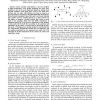Free Online Productivity Tools
i2Speak
i2Symbol
i2OCR
iTex2Img
iWeb2Print
iWeb2Shot
i2Type
iPdf2Split
iPdf2Merge
i2Bopomofo
i2Arabic
i2Style
i2Image
i2PDF
iLatex2Rtf
Sci2ools
ICCAD
2010
IEEE
2010
IEEE
Local clock skew minimization using blockage-aware mixed tree-mesh clock network
Clock network construction is one key problem in high performance VLSI design. Reducing the clock skew variation is one of the most important objectives during clock network synthesis. Local clock skew (LCS) is the clock skew between any two sinks with distance less than or equal to a given threshold. It is defined in the ISPD 2010 High Performance Clock Network Synthesis Contest [1], and it is a novel criterion that captures process variation effects on a clock network. In this paper, we propose a hybrid method that creates a mesh upon a tree topology. Total wire and buffer capacitance is minimized under the LCS and slew constraints. In our method, a clock mesh will be built first according to the positions and capacitance of the sinks. A top-level tree is then built to drive the mesh. A blockage-aware routing method is used during the tree construction. Experimental results show our efficiency and the solution generated by our approach can satisfy the LCS constraint of all the benchm...
| Added | 11 Feb 2011 |
| Updated | 11 Feb 2011 |
| Type | Journal |
| Year | 2010 |
| Where | ICCAD |
| Authors | Linfu Xiao, Zigang Xiao, Zaichen Qian, Yan Jiang, Tao Huang, Haitong Tian, Evangeline F. Y. Young |
Comments (0)

